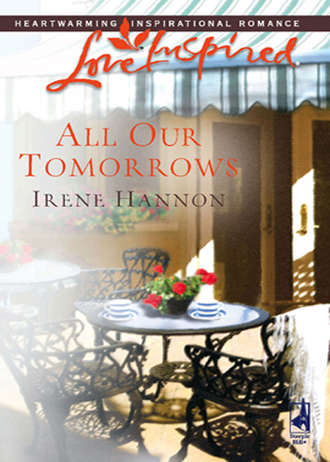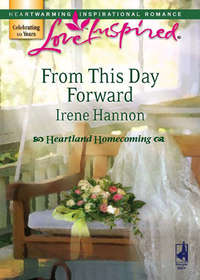
Полная версия
All Our Tomorrows

“Can I walk you to your car?”
Surprised, Caroline shook her head. “Thanks, but that’s not necessary. The parking lot’s right behind the building. I’m just going to set the night alarm, then head down the alley.”
David gave the dim passage a quick look. “I’d feel better about it if you’d let me see you to your car. My mother always told me that a gentleman should never let a lady walk down a dark alley alone.” His lips quirked into a grin.
David was a gentleman, no question about that, Caroline reflected. Even her mother would approve. Not that it mattered. It wasn’t as if they were dating or anything.
But I wish we were.
The startling thought came to her unbidden. How could she think such a thing? This was the brother of the man she’d loved—and lost. The man she still loved. She wasn’t interested in getting involved with any man, let alone David.
But she had to admit to herself that she found David’s presence in the alley—and her life—comforting. He made her feel protected, cared for. And special somehow.
IRENE HANNON
is an award-wining author who has been a writer for as long as she can remember. She “officially” launched her career at the age of ten, when she was one of the winners in a “complete-the-story” contest conducted by a national children’s magazine. More recently, Irene won the coveted RITA® Award for her Love Inspired book Never Say Goodbye. The RITA® Award, which is given annually by Romance Writers of America, is considered the “Oscar” of romance fiction. Irene, who spent many years in an executive corporate communications position with a Fortune 500 company, now devotes herself full-time to her writing career.
In her spare time, she enjoys performing in community musical theater productions, singing in the church choir, gardening, cooking and spending time with family and friends. She and her husband, Tom—an ordained cleric who juggles ecclesiastical duties with a career in international sales—make their home in Missouri.
Irene invites you to visit her Web site at www.irenehannon.com.
All Our Tomorrows
Irene Hannon

He has made everything appropriate to its time.
—Ecclesiastes 3:11.
With thanks and gratitude to the Lord for the
many blessings that have graced my life.
Contents
Chapter One
Chapter Two
Chapter Three
Chapter Four
Chapter Five
Chapter Six
Chapter Seven
Chapter Eight
Chapter Nine
Chapter Ten
Chapter Eleven
Chapter Twelve
Chapter Thirteen
Epilogue
Letter to Reader
Questions for Discussion
Chapter One
“You’ll never guess who I saw today.”
Caroline reached for a roll and gave her mother a bemused glance. She never won at this game, which had become a standard part of their weekly dinner. Judy James knew more people than the President of the United States. Or so it seemed. “I haven’t a clue, Mom.”
“Guess anyway.”
Instead of responding, Caroline popped a chunk of the crusty roll into her mouth, savoring the fresh-baked flavor. No question about it—her mom was a whiz in the kitchen, even if she did have a few idiosyncrasies. Like her penchant for outrageous hats. And her eclectic taste in decorating, thankfully confined to the family room, which had done time as a South Seas beach shack, a Japanese tea house and a Victorian parlor—to name but a few of its incarnations. In light of those eccentricities, Caroline supposed this silly guessing game was a tame aberration. And it was one she felt obliged to indulge, considering how much she owed her mother, who had been a rock during the difficult months when grief had darkened Caroline’s world, blinding her to everything but pain and loss. She couldn’t have made it through that tragic time without the support of the older woman sitting across from her.
“Okay. How about…Marlene Richards.”
A thoughtful expression crossed Judy’s face. “Goodness, I haven’t had any news of Marlene in quite a while. Whatever made you think of her?”
“I reviewed an obit today for a Maureen Richards for the next edition of the paper. No relation, it turns out. But it made me think of Marlene. She was a good Sunday school teacher. A bit unconventional, but all the kids loved her. I wonder what ever happened to her?”
“When she retired, she went on a mission trip to Africa. Liked it so much, she stayed. Last I heard, she lived in a little village somewhere back in the bush and taught school.”
At her mother’s prompt and thorough response, Caroline smiled and shook her head. “How in the world do you do that?”
“What?”
“Keep tabs on so many people.”
“I make it a point to stay connected. And speaking of staying connected…do you want to guess again?”
“Nope.” Focusing her attention on the appetizing pot roast, Caroline cut a generous bite and speared it with her fork.
“All right. Then I’ll tell you. David Sloan.”
The hunger gnawing at Caroline’s stomach suddenly turned into an ache that spread to her heart, and her hand froze halfway to her mouth. “David Sloan?”
“Yes. Isn’t that a strange coincidence? I was at the post office, and as I was leaving I must have dropped my scarf, because the next thing I knew this nice young man came up from behind and handed it to me. He looked familiar, but it took me a few seconds to place him. He didn’t remember me, of course. We only met that one time, just for a few minutes and under such sad circumstances. But when I introduced myself, the oddest expression came over his face.” Judy tilted her head in the manner of an inquisitive bird. “Kind of like the one on yours right now.”
Caroline lowered her fork to her plate, the pot roast untouched. David Sloan. Her fiancé’s brother—and the man who bore at least some measure of responsibility for his death. For a moment, the taste of resentment was sharp and bitter on her tongue, chasing away the fresh flavor of her mother’s homemade roll. But then her conscience kicked in, dissipating her resentment with a reminder that she bore the lion’s share of responsibility for the tragedy—and triggering a crushing, suffocating guilt that crashed over her like a powerful wave, rocking her world.
“Anyway, he took a new job and moved to St. Louis a couple of months ago. Still, it’s a big city. Seems strange that I would run into him, doesn’t it?” Judy prodded.
“Yes.” Caroline could squeeze only one word past her tight throat. With a shaky hand, she reached for her glass of water and took a long, slow swallow, struggling to rein in her wayward emotions.
“I’m sorry, honey.” Distress etched Judy’s features as she studied her daughter’s face. “I had no idea the mere mention of Michael’s brother would upset you.”
“I didn’t, either.” Denying the obvious would be foolish. Her mother knew her too well for that.
Reaching over, Judy patted her hand. “Well, we just won’t talk anymore about it, then. Except I did promise him I’d give you his regards. Now that I’ve done that, tell me about your day. Any hot news at the Chronicle?”
Switching gears wasn’t easy. But Caroline appreciated her mother’s efforts to distract her. It was a technique that had helped keep her sane during those first few weeks after Michael’s death, as her world disintegrated around her. So she tried to change focus. And prompted by Judy’s interested questions, she was able to maintain the semblance of a conversation. As the meal ended, her mother even elicited a smile or two from her with an entertaining story about her latest passion—square dancing—and the lessons she was taking with Harold, her reluctant partner and steady beau.
“So I said to Harold, ‘Just listen to the caller. He’ll tell us what to do. It’s like assembling that glider in my backyard. You just follow the directions and it all comes together.’ And he says, ‘I didn’t read the instructions for the glider.’” Judy shook her head in exasperation. “Now I know why the thing seems a little lopsided. And why he ended up with all those leftover parts.”
By the time Caroline left, with her almost untouched, foil-wrapped dinner and an extra piece of dessert in hand, she felt a bit more settled. But as she drove home through the dark streets of St. Louis, a shiver ran through her—one that she knew was prompted by more than the damp cold on this rainy March night.
Although her numbing, debilitating grief had ebbed over time, the mention of Michael’s brother had dredged it up from the deep recesses of her heart. Along with all the other emotions she’d wrestled into submission these past two years. Guilt. Anger. Blame. Resentment. Some of those feelings were directed at her; others, at David Sloan. But none of them were healthy. As a result, she’d tried her best to suppress them and to move on with her life. Yet it took only the merest incident, like the passing reference to David tonight, to remind her that they hadn’t been tamed, just subdued.
The rain intensified, obscuring her vision, and she flicked on her wipers. With one sweep, they brushed aside the raindrops, giving her a clear view of the road ahead. Too bad she couldn’t banish the muddled emotions in her heart with the same ease. But they clung with a tenacity that rivaled the ivy creeping up the side of her mother’s brick bungalow, imbedding itself with roots that sought—and penetrated—even the tiniest crack.
As she pulled into her parking spot, the light in the front window of her condo welcomed her with its golden warmth and promise of haven. Set on a timer, it came on faithfully every day at five o’clock, lessening the gloom of coming home to a dark, empty apartment. It might be a poor substitute for the warm embrace of the man she’d loved, but that glow buoyed her spirits, which had a tendency to droop after she left the office. Her hectic days at the newspaper kept her too busy to dwell on her personal life during working hours, but it was harder to keep thoughts of the past at bay when she was alone.
It was getting easier, though. Each day, in tiny increments, the past receded a little bit more. It had been months since she’d had to pull the car over because her hands had begun to shake. She didn’t choke up anymore when she heard a song on the radio that reminded her of Michael. She didn’t cry herself to sleep every night. And, once in a while, a whole day passed when she didn’t think about what might have been. That was progress.
She knew Michael would have wanted her to move on. He, of all people, with his love of life and live-for-today attitude, would have been the first to tell her to get over it and get on with her life. To live, to love and to laugh. To make every day count.
Caroline was doing her best to put that philosophy into action. But it didn’t take much—as tonight’s brief conversation proved—to remind her that she still had a long way to go before she reached that ideal.
And to make her wonder if she ever would.
David Sloan angled into a parking place, set the brake and rested his hands on the steering wheel as he read the sign a few doors down. County Chronicle.
A wave of doubt swept over him, and he hesitated. Was he making a mistake coming here? He hadn’t seen Caroline since Michael’s funeral, and her attitude toward him then had been chilly at best. Not that he’d blamed her. If he and Michael hadn’t argued, Michael would have been more focused when he’d gone to meet that contact in the marketplace. His brother had always had great instincts. That was why he’d been such a successful photojournalist, why he’d risen through the ranks of the Associated Press to be one of their top shooters. It was why they’d sent him to the Middle East, knowing that he’d be able to get into the thick of things, make great images and emerge unscathed. Until that fateful day in the marketplace, when he had no doubt been distracted by their argument, and by concerns for their mother. So David understood why Caroline would blame him for Michael’s death. For turning her world upside down. For destroying a man they’d both loved in the prime of his life. He blamed himself, too.
For almost two years he’d grappled with his complicity. But finally he’d come to terms with it—at least as well as he would ever be able to, he suspected. And some good had come out of his struggle, too. After much prayer, he’d reevaluated his life and made some dramatic changes, following a new path the Lord had revealed to him. The work he was doing now might not offer him the kind of income provided by the high-stakes mergers and acquisitions he’d brokered in his previous job, but it paid dividends in human terms. And even though it had been hard for David to let go of the financial security his former position had offered, he’d put his trust in the Lord three months ago and made the change. So far, he hadn’t had a single regret.
But he had plenty of regrets about his role in Michael’s death. And one of them involved Caroline. He’d always felt the need to contact her, to express his sorrow, to apologize. Though they’d sat side by side at Michael’s funeral, her grief had been too thick for words to penetrate. When he had reached out a tentative, comforting hand to her once during those terrible few days, she’d recoiled, staring at him with a look of such profound loss and resentment that it was still seared in his memory. That was the main reason he’d never tried to contact her. Not the only one, but the main one.
As for the other reason…he wasn’t going to go there. Until yesterday, it had been irrelevant, since he’d never expected to see her again. Yet the chance meeting with her mother, and the medallion resting in the inside pocket of his suit jacket, its weight pressing against his heart, had prodded him to do what he should have done months before. If she brushed him aside, so be it. He still had to make the effort to reach out to her and apologize. And then he would move on—and do his best to forget about her.
From the outside, the County Chronicle looked like any other storefront on the busy Kirkwood street, which still retained a small-town flavor even though it was a close-in suburb of St. Louis. On his way to the front door, he passed Dubrov’s Bakery, Andrea’s card shop and Fitzgerald’s Café, all of which seemed to be family operations instead of the chain stores that were multiplying like rabbits around the country. He liked that. Liked the notion that even in this modern age of mega-stores and conglomerates—many of which he’d helped to create in his previous job—the entrepreneurial spirit continued to flourish. That people with enough drive and determination could still create a successful business to pass down to the next generation.
As he stepped into the lobby of the Chronicle, David tried to calm his erratic pulse. The first moments would be awkward, at best. Please, Lord, help me find the words to make the apology I came here to offer, he prayed.
“May I help you, sir?” A dark-haired woman, who looked to be in her early thirties, spoke to him from behind a desk. Her nameplate identified her as Mary Ramirez, receptionist.
“Yes. Is Caroline James in?”
“Do you have an appointment?”
“No. I just took a chance she might be available. I only need a few minutes.”
“May I tell her what this is about?” The woman reached for the phone.
“I’m an old…acquaintance. She’ll know the name. David Sloan.”
The woman didn’t look convinced, but she punched in some numbers, anyway. “She’s got a very full schedule. I’m not sure she’ll be able to see you.”
Caroline’s mother had told him that she was the managing editor of the paper, so he was sure she was busy. And perhaps not inclined to mix professional and personal business. But since she didn’t have a listed phone number—he’d checked that first—he hoped she’d give him a few minutes at the office.
“Caroline, it’s Mary. There’s a David Sloan here who would like to see you.” After several seconds of silence, the receptionist spoke again. “Caroline? Are you still there?”
Shock. That had to account for Caroline’s delayed response, David reasoned. Which did not bode well for the reception he was going to get—if he got one at all.
“All right.” The woman was speaking again. “Yes, I’ll let him know.” She hung up and gave David a speculative look. “She’ll be out in a sec. Have a seat while you wait.” She gestured to a small grouping of furniture with a coffee table in the middle.
Relieved, David nodded and moved to one of the modernistic upholstered chairs. He didn’t feel like sitting, but pacing wasn’t an option, either. The receptionist was already casting discreet, but interested, glances his way. He didn’t want to arouse any more curiosity than necessary. With studied casualness, he sat in one of the chairs, reached for a copy of the newspaper from among those fanned on the coffee table, leaned back and pretended to read the blur of words on the page in front of him. He was more nervous about this encounter than any of the high-powered, deal-making sessions he’d once participated in, when hundreds of millions of dollars had sometimes hung in the balance. Maybe because the capital here was emotional, not monetary. And for another reason he didn’t want to consider.
As the minutes ticked by, David grew more apprehensive. What if Caroline had changed her mind? What if she refused to see him? He’d get the medallion to her somehow, he vowed, find another way to apologize. Perhaps he’d resort to a letter. That would be easier than dealing with her face-to-face. But not as personal. Or as noble. Still, if she didn’t come out, he’d have to conclude that she didn’t want to see him, and he’d be left with no other option. It wasn’t ideal, but he…
Suddenly, the door to the inner offices opened and Caroline stepped through. He set aside the newspaper and rose slowly, using the opportunity to do a quick assessment of the woman who stood before him.
She was still gorgeous, no question about it. Michael had always appreciated beautiful women. Just as it had the first time they’d met, David’s heart tripped into double time. Caroline was model-tall, just three or four inches shorter than his own six-foot frame. And slender. Maybe too slender now, he corrected himself. A jade-green silk blouse was tucked into her pencil-slim black wool skirt, and a delicate gold necklace dipped into the hollow of her throat. She radiated the same style, class and poise he recalled from their first meeting, when Michael had brought her home for Christmas to introduce his fiancée to him and their mother. Now, as then, he was struck by her sleek, shimmery hair, which was the color of an autumn hillside—rich brown, laced with glints of gold, bronze and copper. She’d changed the style, though. He recalled her hair being shorter. Her new look was longer, just brushing her shoulders.
He noticed other new things, as well. Faint, parallel furrows in her brow. Fine lines at the corners of her eyes, and a deep, lingering sadness in their hazel depths. She’d also aged in some subtle way he couldn’t quite identify. He knew she was a year younger than him. Michael had mentioned it once. And it wasn’t that she looked older than her thirty-five years, exactly. It was just that there was a weariness in her eyes that hadn’t been there before. A timeless, ancient expression not related to age, but to experience. The kind of look shared by people who’d seen too much, been through too much. But at least the animosity he’d glimpsed at the funeral was gone. In its place was wariness.
As David stood there, Caroline looked him over as well, though she had a less vivid picture in her mind for comparison. The Christmas they’d come home to announce their engagement to both families, she’d been focused on Michael. And at the funeral, her grief had been so overwhelming that she’d been aware of David only on a peripheral level. In fact, she’d gone out of her way to avoid him as she’d tried to deal with the avalanche of shock, guilt and resentment that had buried her in a suffocating blackness.
But she had always recognized the distinct differences in the two brothers. David was a couple of inches shorter than Michael, and his hair was dark brown while Michael’s had been sandy and sun-streaked. Their eyes also provided a contrast. Michael’s had been a sparkling, vivid blue, while David’s were quiet and deep brown. Just as their physical appearance differed, so, too, did their personalities. Michael had been an adventurous extrovert. David was a cautious introvert. Or at least that’s how Michael had characterized him. He’d always referred to David, five years his junior, as his kid brother, and called him “the suit” in a good-natured way. He’d told Caroline that David was destined for the corporate world and power lunches, that one day he would be rich and famous while Michael continued to tilt at windmills. And that was just fine with Caroline. It was one of the things she’d loved about Michael. His absolute passion for truth and his zeal for his job were the first things she’d noticed about him. The world needed more people like him. Instead, it had one less. Thanks to her—and, to some degree, the man now looking at her from across the room.
Caroline had almost refused to see David. But what good would that have done? Any blame he bore for Michael’s death was far less than her own, after all. And Michael wouldn’t have wanted her to be unkind to David. Though the brothers had been estranged for several weeks prior to Michael’s death, she knew that their break had weighed on his mind. Despite their difference of opinion on their mother’s care, Michael had never stopped loving his kid brother. And she suspected the feeling was mutual. She was sorry they hadn’t had a chance to resolve their dispute before Michael was killed.
But that was in the past. Right now, David was waiting for her to speak, and she forced herself to walk toward him. Michael would want her to be cordial, she knew. Still, she found the whole situation awkward. And unsettling. Not to mention painful.
“Hello, David.” She held out her hand, and her fingers were engulfed in a warm, firm clasp.
“Hello, Caroline. Thank you for seeing me.”
His voice sounded huskier than she remembered, and despite the almost palpable tension between them, he exuded a deep-seated, inner calmness that somehow eased her nerves. Yet another difference between the brothers, she mused. Michael’s dynamic energy had infused those around him with excitement and enthusiasm. David, on the other hand, came across as calm, steady and in control. Someone who planned before plunging. Michael had always plunged first and planned on the fly. That spontaneity was one of the reasons he’d been so good at his job.
“I’m afraid I don’t have much time,” she told David.
“That’s okay. I took a chance stopping by without warning. But after I ran into your mother yesterday, I decided I’d put this off long enough.”
“Mom told me she saw you at the post office. How is your mother doing?”
“She died a year ago. The Alzheimer’s progressed far more rapidly than anyone anticipated. And her heart just kept getting weaker.”
Her query had been routine and mundane, and she’d expected the same kind of response. Instead, his reply shocked her. Sympathy replaced wariness in her eyes. “I’m so sorry.”
“Thank you. It was a shock, but in many ways I’m glad God called her home. Alzheimer’s is an awful disease. It robs people of everything that made them who they were. In the end, she didn’t know me anymore, or remember anything about the past. The mother I knew had left months before her physical body stopped functioning.”
So now David was alone. Michael had told her once that they had no other relatives. Both of their parents had been only children, and their father had died years before.









